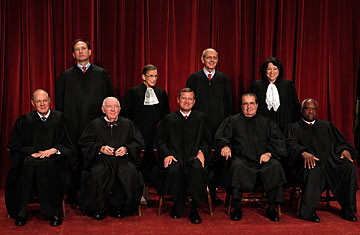
The Supreme Court Justices gather for an official picture in Washington on Sept. 29, 2009
(2 of 2)
But then a funny thing happened. Miranda warnings became a staple of television shows and movies. Americans got used to them — and found that they liked them. People began to see the Miranda ruling not as a sop to criminals but as a proud reminder that we are a nation in which even the police must play by the rules.
For years, conservatives continued to attack the Miranda decision, holding out hope that it would be reversed. In 2000, it seemed like it might finally happen — the court had a case that posed a direct challenge to Miranda, and it had a five-member conservative majority. But in the end, Chief Justice William Rehnquist, leader of the conservative bloc, wrote an opinion for a 7-2 majority reaffirming Miranda. "Miranda has become embedded in routine police practice," he wrote, "to the point where the warnings have become part of our national culture."
Instead of overruling Miranda, the conservative Justices have now done something they are doing to many landmark progressive decisions — quietly chipping away to the point that they have little power left.
The court has ruled that although statements obtained in violation of Miranda cannot be used by prosecutors in their direct case, they can be used to impeach a defendant who testifies differently at trial. The court also created a "public safety" exception, by which police can question suspects without reading them their Miranda rights if there is an imminent danger — an exception law enforcement is reportedly using a great deal in terrorism cases, including the recent Times Square bombing attempt.
With this week's ruling, however, the chipping away reaches a new level — an important chunk of Miranda has fallen away. The heavy burden that the police once had to show that someone had waived his Miranda rights is now significantly reduced.
The Buddhists are known for their koans, enigmatic questions and statements that cannot be readily understood by rational thinking, like "What is the sound of one hand clapping?"
This week, the Supreme Court imported this sort of beyond-rational thinking into constitutional law. We now have a right to remain silent that can be exercised only by speaking up.
